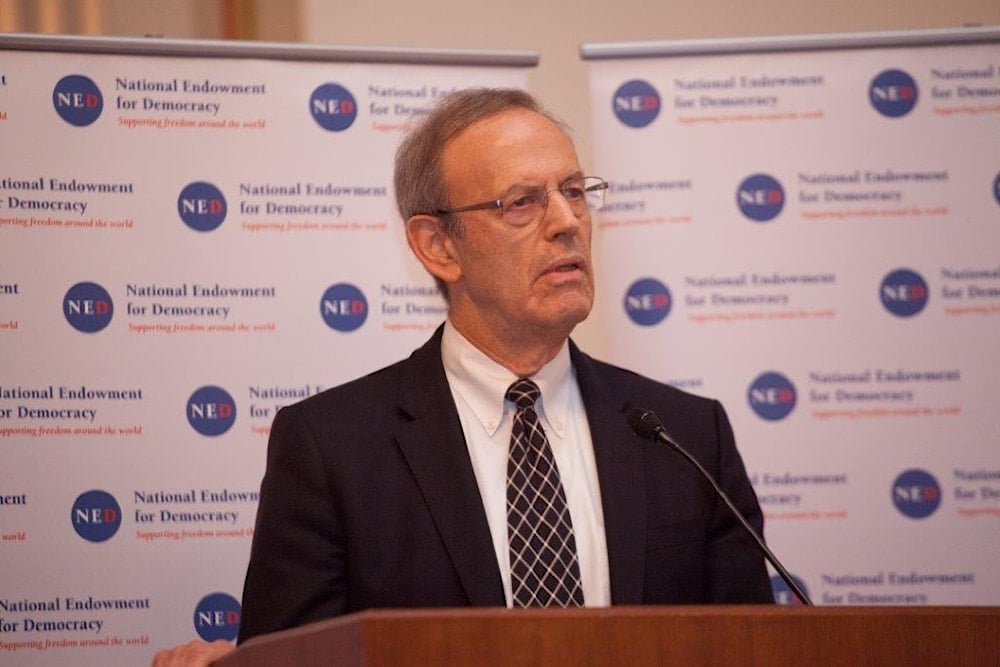Leaked docs expose US plot to control Iran opposition movement: Report
Leaked documents obtained by The Grayzone reveal a covert effort by Carl Gershman and US neoconservatives to hijack Iran's opposition movements for toppling the government, promoting military intervention and sanctions.
-

Carl Gershman served from 1984-2021 as the founding president of the National Endowment for Democracy, a private, congressionally-funded, grant-making institution that supports non-governmental groups working to disrupt governments the world (National Endowment of Democracy)
Leaked documents obtained by The Grayzone reveal a covert effort by Carl Gershman, former leader of the National Endowment for Democracy (NED), to consolidate control over Iran's opposition movement by promoting a radical, neoconservative agenda.
The leaks show that Gershman, known for leading global efforts to disrupt governments, sought to establish an "Iran Freedom Coalition" (IFC) composed of pro-Western Iranian activists and neoconservative operatives in the US.
The coalition was designed to impose exiled leadership over Iran's protest movement, particularly the Women, Life, Freedom (WLF) movement, and advance a strategy of sowing internal dissent aimed at toppling the Iranian government.
Gershman's initiative, which involves leveraging US State Department resources, focuses on consolidating the influence of hardline figures who advocate for US military intervention and severe sanctions on Iran.
These leaks expose how the Iranian opposition has increasingly become a tool for the "Bomb Iran" lobby in Washington.
The coalition includes well-known figures like William Kristol, a neoconservative with a long history of lobbying for US invasions in the Middle East, and Joshua Muravchik, a vocal supporter of war with Iran.
Gershman's strategy revolves around promoting these and other US-backed Iranian exiles as the international face of Iran's opposition.
Read more: Iran captures propagandist Israeli Mossad agent
The leaks also highlight how Gershman attempted to tap into a $55 million fund from the US State Department's Iran Democracy Fund, claiming that some of the funds should be diverted to hardline initiatives that reject Iran's current political processes.
He proposed that this money be managed by the NED to aid the so-called "resistance movement," positioning the IFC as a vehicle to organize various exiled Iranian activists, human rights groups, and pro-Western thinkers under the guise of supporting Iran's internal protests.
The WLF movement began after the death of Mahsa Amini in September 2022, which sparked widespread protests against Iran's mandatory hijab law. However, despite initial traction, the protests quickly fizzled out in Iran.
Gershman's leaked proposal reveals that US interventionists, including Gershman, attempted to hijack these protests by promoting exiled figures such as Reza Pahlavi, the son of the former Shah of Iran, and Masih Alinejad, a longtime recipient of US government funding who has called for military attacks on Iran.
These figures became the international face of the WLF movement, despite complaints from grassroots activists in Iran that foreign forces had co-opted their cause.
Read more: Four Mossad-linked spies, saboteurs executed in Iran
Gershman's proposed IFC was envisioned to serve as a means to sustain international pressure on Iran, leveraging boycotts, sanctions, and other economic tools to cripple Iran's economy and undermine the regime.
The coalition's composition of US-backed interventionists and neoconservative figures underscores how Iran's pro-democracy movement has been repurposed by Western interests seeking to influence Iran's internal affairs.
Further emails reveal that Gershman sought help from political allies such as Congressman Mario Díaz-Balart, attempting to use his influence to direct a portion of the Iran Democracy Fund toward Gershman's own regime-change projects.
Gershman aimed to form working groups within the IFC to support the supposed Iranian "uprising" by channeling resources to select Iranian exile groups and international activists who support US interventionist policies.
Gershman's efforts also highlight a power struggle between himself and younger, more progressive NED successors. After retiring from the NED in 2021, Gershman continued to push his own projects outside the formal structure of the organization.
His leaked emails reflect his frustration with the current State Department guidelines for Iran-related funding, which focused more on civil society engagement rather than direct regime change, prompting him to propose hardline alternatives.
The revelations point to a larger issue: the manipulation of Iranian opposition movements by US-backed figures and neoconservative elements in Washington, with little regard for the consequences on average Iranians.
Despite the WLF movement losing momentum inside Iran, the coalition proposed by Gershman and other interventionists seeks to sustain the movement's image abroad, using it to justify ongoing US pressure on Iran, including economic sanctions and diplomatic isolation.
Read more: West politically exploits death of Mahsa Amini through fake news

 4 Min Read
4 Min Read








